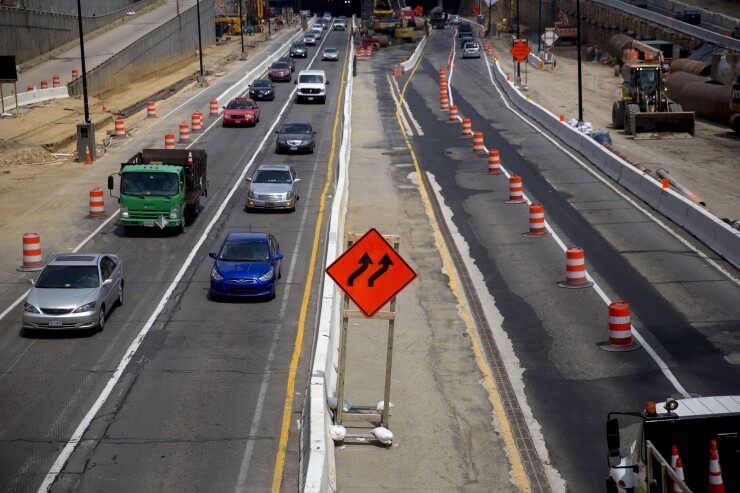WASHINGTON — Eliminating caps on private activity bonds while preserving the tax-exempt status of munis could encourage more insurers to invest in infrastructure, according to a new report released this week.
In a recent white paper released by the Teachers Insurance and Annuity Association (TIAA), the insurance company said it views infrastructure projects as an attractive area for investment, and suggested ways government could help facilitate such investment through public-private partnerships.
"We are eager to expand investments in infrastructure through P3s—and we are not alone," TIAA said in the paper. "But this will be possible only with the right policy support."
TIAA urged policymakers to preserve the tax-exempt treatment of munis, as life insurance companies account for about 10% of holdings in the almost $3.9 trillion municipal market.
As of 2017, life insurance companies had invested over $1 trillion in infrastructure projects, according to the report. The U.S. could see almost a $2.1 trillion investment shortfall in the next 10 years, it said.
H.R.1, the recent tax reform bill, maintained the tax exemption, and TIAA wants certain time-based regulations to be eased to allow partnerships to succeed. The bill made changes such as making net operating loss deductions income-based and also created restrictions on some contractual timeframes, according to the report.
Milum Livesay, TIAA VP of Financial Governance, said tax exemption helps to close the investment gap. deficit at the federal level. Without tax exemptions, municipal governments could be left without buyers and it would be harder to finance projects, he added.
TIAA said policymakers could also help by lifting the cap on private activity bond issuance. PAB issuance is subject to an annual per-state cap set by a formula, and in 2018 was the greater of $105 per capita or $311.38 million.
The company said it was encouraged by President Donald Trump’s proposal to “create flexibility and broaden eligibility to facilitate use of PAB’s,” which could include reconstruction projects, environment management, surface transportation facilities and more.
TIAA wants to help solve the shortfall problem by investing in infrastructure, but uncertainty in regulations, inconsistent guidelines and lack of standardization makes it difficult to invest.
In a market where public-private partnerships are thriving, the report noted, unpredictability make it more difficult to invest.

The National Association of Insurance Commissioners recently began focusing on infrastructure investment resources, standardized valuations and regulatory advice, according to TIAA’s report.
NAICC could help insurance commissioners become better acquainted with private-public partnerships while establishing better relationships with states.
Differences in rules from state to state make it complicated for investors to keep up, TIAA said.
Fourteen states have no legislation enabling the use of public-private partnerships, while the rest have different requirements.. Livesay wants more cohesiveness between local, state and federal governments to save on time.
“If there’s a way to streamline and make more efficient that permitting and approval process, that would shrink the timeline on these investments, getting to full-operational status which is where we can then realize the benefits of the investment," he said.
Revenue has become harder to find, Joung Lee, policy director at American Association of State Highway and Transportation Officials, said.
"While I think there are a lot of dollars that are available to be able to be put into P3’s, what we’re not seeing is the ability to raise revenues to provide greater return to those private investors," Lee said.
It can be risky for investors, too. If a project doesn’t do as well as originally thought, private companies shoulder the loss.
"The private sector partner would actually take on the financing risk as well as typically construction and then the operation and maintenance as well," Lee said.
By eliminating the cap on private activity bonds, it allows a P3 partner to take advantage of low cost financing, he said.
The Florida I-595 Project, a $1.6 billion dollar highway project, was funded by a public-private partnership including TIAA and ACS Instructure Development Inc. ACS obtained bank financing, put in its own equity, and used a low-interest federal loan through the Transportation Infrastructure Finance and Innovation Act program to execute the project.
Guillermo Canedo, a public information specialist for District 4 in the Florida Department of Transportation, said the 2014 i595 Express project went smoothly using P3’s.
“I think our perspective from the department is that it has worked out well,” Canedo said.
Over 180,000 vehicles a day use the east-west highway in southeast Florida and by 2034, it’s expected to increase to 300,000 commuters a day.
He added tolls paid on the highway go toward to recoup the vendor’s investment.
“Basically the vendor built the road, was licensed by the department of transportation as a public-private venture and now the vendor operates I-595,” he said.
Livesay said the I-595 project was a good opportunity for them and the type of investment they wanted to make.
“Infrastructure is something that simply needs to be done and is needed in the U.S. and is needed globally so it is something where we really need to look hard at all these types of opportunities," Livesay said.





